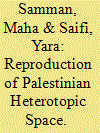|
|
|
Sort Order |
|
|
|
Items / Page
|
|
|
|
|
|
|
| Srl | Item |
| 1 |
ID:
174260


|
|
|
|
|
| Summary/Abstract |
This paper examines Mahmoud Darwish's exploration of the political, geographical, existential, and metaphysical dimensions of displacement, banishment, and statelessness in his 2005 lyrical epic “Exile.” The paper offers an analysis of Darwish's treatment of dialectic, heteroglossia, the juxtaposition of the national and the existential, and conflicting temporalities, as well as political uncertainty and metaphysical fear. With particular reference to the paradoxical portrayal of space in “Exile”—the juxtaposition of the near and far, real and illusory, localized and dispersed—I also examine the ways in which Palestinian identity, as narrated in this poem, is destabilized and dispersed by what Michel Foucault calls “heterotopic space.”
|
|
|
|
|
|
|
|
|
|
|
|
|
|
|
|
| 2 |
ID:
186983


|
|
|
|
|
| Summary/Abstract |
This article was written during the first wave of the COVID-19 pandemic in East Jerusalem between March and June 2020. It discusses how the Palestinians approached the pandemic within the context of occupation, and how they used their power to reproduce what Henri Lefebvre called heterotopic spaces. People articulated these spaces accumulatively as they sought meaning in their daily lives, while managing the pandemic and benefitting from their previous experiences during their struggle against Israeli occupation. Thus, the aim is to shed light on the evolving role of civil society to support local action in dealing with a pandemic and to understand COVID-19 from peoples’ perspective rather than from a top-bottom lens in occupied cities. The methodology is multilayered: We use theoretical concepts of heterotopic spaces and analyze them through the social/societal, the temporal/historical, and the spatial/geographical forms of knowledge borrowed from Michel Foucault, Henri Lefebvre, and Edward Soja. It also builds on participant observation, official and media sources, and semi-structured interviews conducted with heads of committees of the Jerusalem Cluster community initiative. Accordingly, the study illustrates how the voices of the people become more significant in taking a leading role in a pandemic crisis in an occupied city.
|
|
|
|
|
|
|
|
|
|
|
|
|
|
|
|
|
|
|
|
|